Medical Disclaimer: This article is for informational purposes only and does not replace professional veterinary advice. If your dog is showing signs of illness, consult your veterinarian promptly.
Table of Contents
Is Your Dog’s Tummy Trouble Just a Fluke — or Something More Serious?
One moment your dog is bounding to their food bowl with tail-wagging excitement. The next, they’re turning their nose up at dinner, vomiting on the rug, or needing urgent backyard trips. It’s a situation almost every pet owner faces at some point, and trust me, as a small-animal vet in Ottawa, I see these cases in clinic nearly every day.
Digestive problems in dogs can come on quickly and range from harmless to life-threatening. Maybe your pup just snuck some greasy leftovers or nibbled something questionable on a walk. Or maybe their symptoms hint at something more serious, like pancreatitis or bloat. As their guardian, it can be hard to tell the difference and that uncertainty is stressful.
But here’s the good news: with a bit of know-how, many digestive issues can be managed effectively at home, and serious conditions can be caught early. In this comprehensive guide, I’ll walk you through the most common causes of stomach trouble in dogs, what to watch for, how to help your pet feel better faster, and when it’s time to call your vet. Whether this is your first tummy scare or your dog has a sensitive system, you’re in the right place for trusted, vet-approved advice.
Key Takeaways: Digestive Problems in Dogs
| 🐶 Quick Facts for Pet Owners |
|---|
| • Digestive problems in dogs like vomiting, diarrhea, and bloat are common, but many are preventable. |
| • Early symptoms often include appetite changes, vomiting, diarrhea, or constipation. |
| • Mild issues may resolve with bland diets and rest, but persistent signs need a vet visit. |
| • Never give human medications to dogs unless directed by a vet. |
| • Prevent problems with slow diet transitions, parasite control, and avoiding fatty or toxic foods. |
| • Costs for treating digestive problems in dogs in Canada can range from $150 to over $2,000 depending on severity. |
Understanding Canine Digestion
You can also see: https://doglifeexpert.com/7-powerful-reasons-why-your-dog-losing-hair/
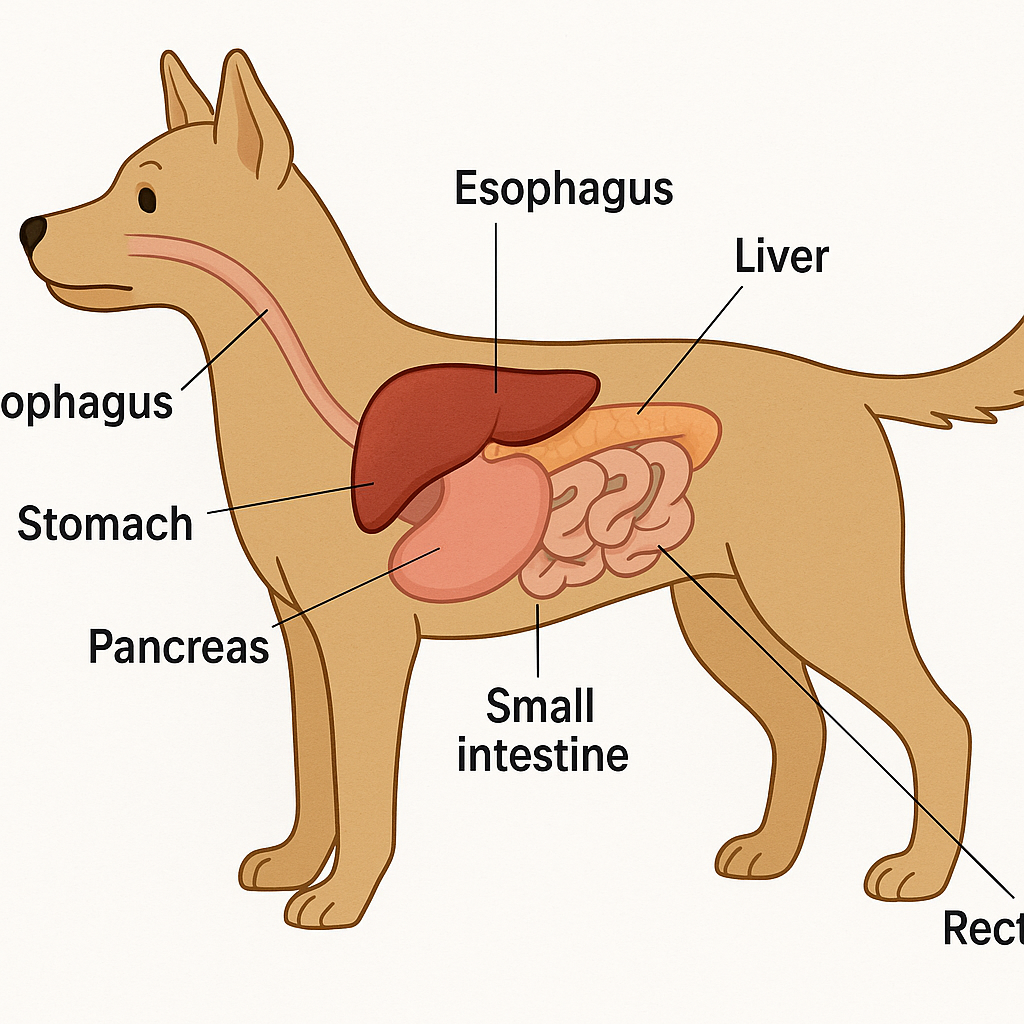
How the Digestive System Works
A dog’s digestive system starts at the mouth and ends at the rectum, with key organs like the stomach, intestines, pancreas, and liver doing the heavy lifting. Each part must function properly to digest food, absorb nutrients, and eliminate waste efficiently. When something goes wrong anywhere along this pathway, it can result in one of many digestive problems in dogs.
Common Causes of Digestive Upset
Digestive issues may seem sudden, but they often stem from everyday factors such as:
- Dietary indiscretion: Dogs are notorious for raiding garbage or stealing snacks.
- Sudden diet changes: Switching foods too quickly upsets gut bacteria.
- Parasites: Worms and protozoa like giardia are common causes of diarrhea.
- Stress: Big changes like moving homes can disrupt digestion.
- Chronic diseases: Issues like pancreatitis, inflammatory bowel disease, or food allergies.
By understanding how digestion works and what disrupts it, you can better prevent and treat digestive problems in dogs.
8 Common Digestive Issues in Dogs
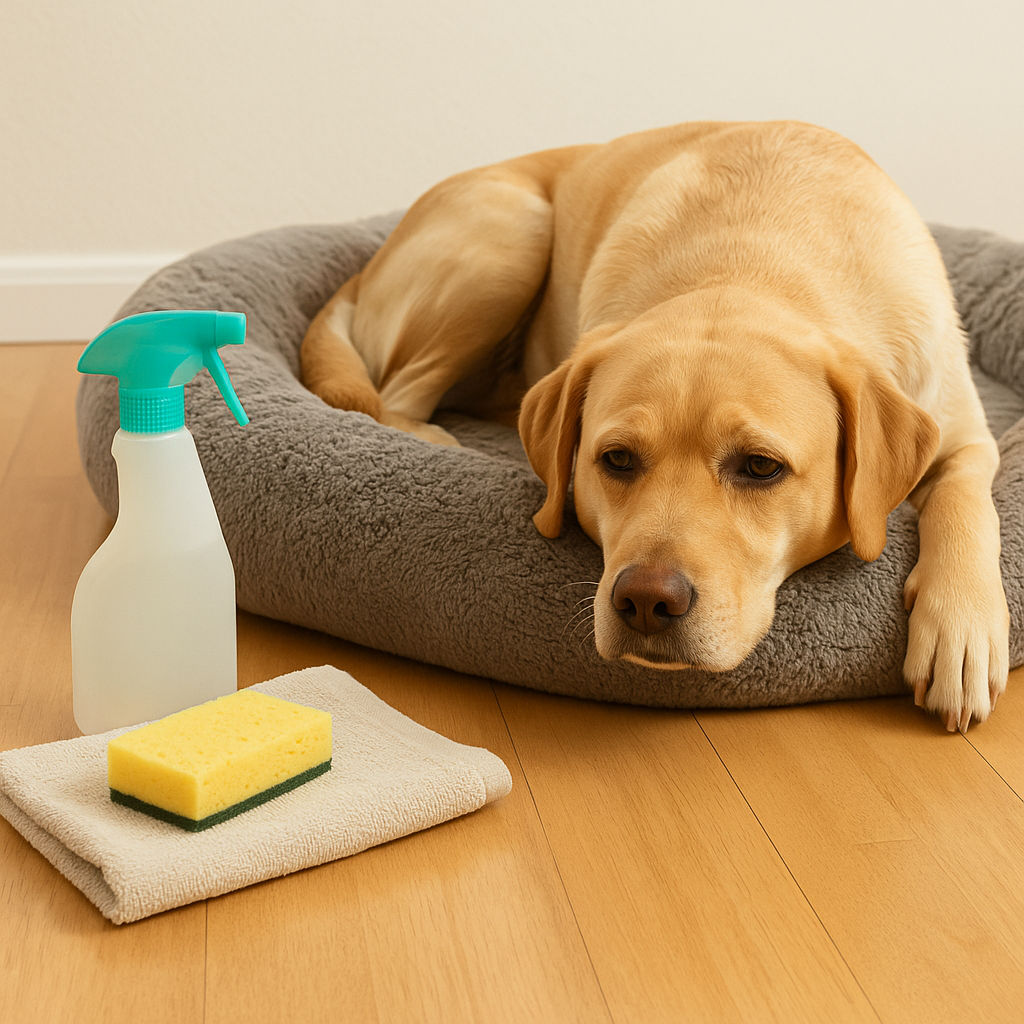
1. Vomiting
Vomiting is one of the most noticeable and frequent digestive problems in dogs. It can be harmless like after eating too quickly or signal a deeper issue such as pancreatitis or toxin ingestion.
Common causes:
- Eating spoiled food or garbage
- Sudden food changes
- Parasites (e.g., roundworms)
- Infections or systemic illness
Treatment tips:
- Withhold food for 12–24 hours (not water).
- Feed small portions of a bland diet (e.g., boiled chicken and rice).
- Seek veterinary help if vomiting persists beyond 24 hours or includes blood.
Vet Insight: In my Ottawa clinic, I once treated a Lab who vomited after swallowing a sock an X-ray revealed the blockage. Surgery saved her life.
https://www.akc.org/expert-advice/health/dog-vomiting-causes-treatment
2. Diarrhea
Loose or frequent stools are common signs of digestive problems in dogs, ranging from mild to life-threatening.
Causes include:
- Parasites like giardia or hookworms
- Bacterial infections (e.g., Salmonella)
- Stress or anxiety
- Sudden diet changes or food allergies
Home care:
- Bland diet for 3–5 days
- Probiotics like FortiFlora
- Ensure hydration (use vet-approved electrolyte solutions)
When to see a vet:
- Diarrhea lasts more than 2 days
- Blood, mucus, or black/tarry stools appear
- Dog seems lethargic or in pain
3. Constipation
Not all digestive problems in dogs involve too much stool sometimes the issue is not enough. Constipation can be uncomfortable and even dangerous if left untreated.
Common causes:
- Low-fiber diet
- Inadequate hydration
- Ingesting bones or foreign objects
- Painful conditions like arthritis or anal gland issues
Signs to watch for:
- Straining without results
- Hard, dry stool
- Lethargy or appetite loss
Home tips:
- Add 1–2 tablespoons of canned pumpkin to meals
- Encourage water intake
- Regular light exercise
Veterinary care may include:
- Enemas (never attempt at home)
- Laxatives like lactulose (prescribed)
- Checking for underlying medical issues (e.g., hypothyroidism)
4. Gastritis
Gastritis, or stomach inflammation, often presents as vomiting and discomfort, particularly after eating something irritating.
Causes include:
- Spoiled food or trash ingestion
- Bacterial infections (e.g., Helicobacter)
- Swallowed foreign objects
- Stress or chronic illness
Treatment:
- Bland diet and rest
- Vet-prescribed antacids or gastroprotectants like sucralfate
- Diagnostic imaging or endoscopy for chronic cases
Prevention:
- Keep garbage secure
- Avoid sudden diet changes
- Monitor pets prone to scavenging
5. Colitis
Colitis refers to inflammation of the colon and is one of the more frequent digestive problems in dogs I see during seasonal changes or after a boarding stay.
Symptoms:
- Sudden, frequent diarrhea with mucus or blood
- Straining to defecate (tenesmus)
- Normal appetite despite loose stools
Triggers:
- Stress (e.g., loud noises, kennel stays)
- Parasites like whipworms
- Bacterial infections or food sensitivities
Treatment options:
- High-fiber or prescription diets
- Probiotics for gut flora balance
- Dewormers or anti-inflammatory meds (e.g., sulfasalazine)
Prevention:
- Reduce stress and maintain routine
- Avoid dietary indiscretion
- Use regular parasite control
6. Pancreatitis
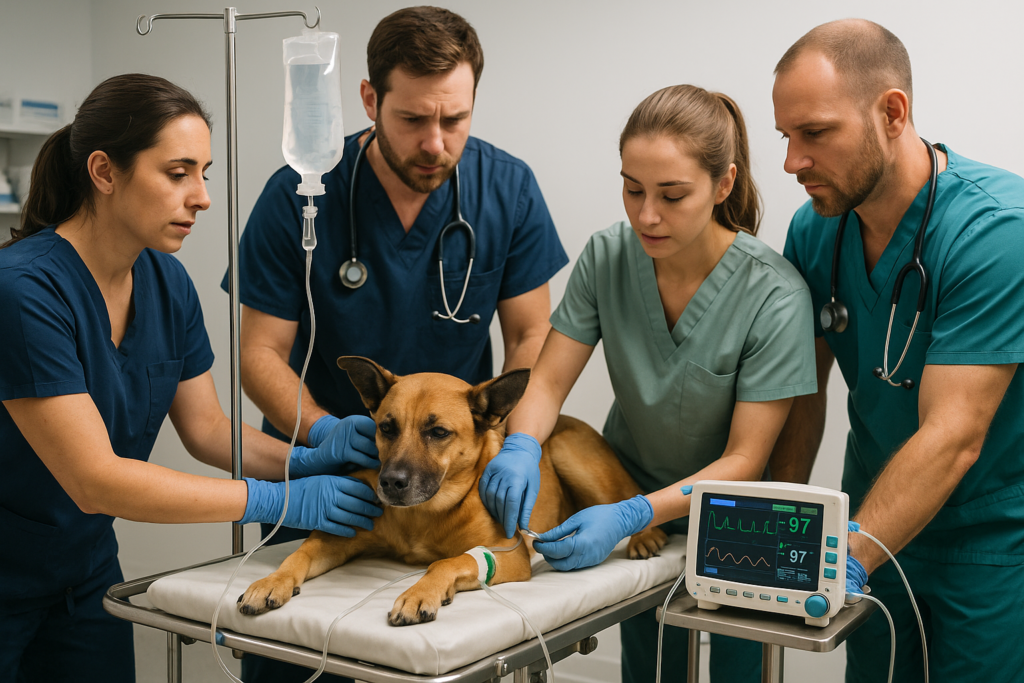
This condition is an emergency in many cases and one of the more serious digestive problems in dogs, especially those fed fatty scraps.
Breeds at risk: Miniature Schnauzers, Poodles, and overweight dogs
Symptoms:
- Vomiting and abdominal pain (hunched posture)
- Lethargy and reduced appetite
- Fever or diarrhea
Vet-based treatment:
- Hospitalization, IV fluids, pain relief
- Anti-nausea meds and strict low-fat diet
- Blood tests (e.g., cPLI) for diagnosis
Prevention:
- Avoid high-fat foods like bacon or gravy
- Maintain healthy weight
- Use low-fat treats like carrots or green beans
7. Bloat (Gastric Dilatation-Volvulus or GDV)
Bloat is a life-threatening emergency among the most critical digestive problems in dogs. It occurs when the stomach fills with gas and potentially twists, cutting off blood flow.
Symptoms:
- Enlarged or tight abdomen
- Retching without producing vomit
- Restlessness, drooling, or collapse
Who’s at risk: Deep-chested breeds like Great Danes, German Shepherds, and Boxers
Emergency treatment:
- Immediate veterinary intervention to stabilize and decompress the stomach
- Surgery to correct twisting and secure the stomach wall (gastropexy)
Preventive steps:
- Feed smaller meals throughout the day
- Use slow-feed bowls
- Limit vigorous activity for one to two hours after eating
- Discuss preventive gastropexy with your vet if your dog is a high-risk breed
8. Food Allergies and Intolerances
Chronic digestive problems in dogs are sometimes linked to food sensitivities or allergies. These are often confused with other digestive conditions but require different management.
Common triggers:
- Animal proteins like chicken, beef, or dairy
- Carbohydrates or fillers in commercial food
- Artificial additives or preservatives
Symptoms:
- Recurring diarrhea or vomiting
- Skin issues like itching or ear infections
- Gas or bloating
Diagnosis and management:
- 8 to 12 week elimination trial using novel or hydrolyzed protein diets
- Avoiding known allergens long term
- Prescription diets such as Royal Canin Hypoallergenic or Hill’s z/d (link to product recommended once)
Home tip: Keep a food diary to track flare-ups and help your vet identify dietary causes
How to Manage Digestive Issues at Home
5-Minute Home Checklist for Pet Parents
If your dog is acting “off,” this quick at-home checklist can help you decide whether it’s safe to monitor them or time to call your vet. Take five minutes to observe the following:
🥤 Is your dog still drinking water?
Hydration is essential, especially if your dog is vomiting or has diarrhea. Check their water bowl. Are they drinking normally, or avoiding it? Gently pinch the skin between their shoulder blades if it stays tented instead of snapping back, they may be dehydrated.
💩 Are there signs of vomiting, diarrhea, or constipation?
Look for loose stools, mucus or blood in poop, straining without producing anything, or repeated episodes of vomiting. Even one symptom can be a clue to an underlying issue.
🗑️ Could they have eaten something they shouldn’t have?
Dogs are curious. Think back did they get into the trash, compost, or counter-surf leftovers? Common culprits include bones, chocolate, grapes, fatty scraps, or spoiled food. If you’re unsure, inspect your garbage and yard for clues.
🐕 Are they showing signs of pain or bloating?
Pay attention to posture. Is your dog standing with a hunched back, guarding their belly, or stretching repeatedly? A bloated abdomen that feels tight or looks visibly enlarged is an emergency especially if your dog is also retching or restless.
😴 Do they seem tired, disoriented, or uninterested in food?
Lethargy, ignoring meals, or hiding behavior are subtle signs something’s wrong. If they’re usually enthusiastic about food but are skipping meals, this may be more than just a picky phase.
🩺 If you answered “yes” to two or more of these questions or if any symptom lasts longer than 24 hours call your veterinarian. Some digestive problems in dogs resolve with rest and diet changes, but others can escalate quickly. Early action makes a big difference..
Safe Bland Diet Options
For mild digestive problems in dogs, a temporary bland diet can help soothe the gut:
| Ingredient | Preparation |
|---|---|
| Boiled chicken | Skinless, boneless, no seasoning |
| White rice | Plain, well-cooked |
| Canned pumpkin | Pure (not pie filling), 1 tsp–1 tbsp |
| Boiled turkey | Lean ground, drained fat |
| Cottage cheese | Plain, low-fat (if dairy tolerated) |
Feed small portions every 3 to 4 hours and monitor your dog’s response. Gradually transition back to their regular food over several days once symptoms improve.
When to See a Vet
Some digestive problems in dogs are too serious for home care. Call your vet immediately if:
- Vomiting or diarrhea lasts over 24 to 48 hours
- You see blood in vomit or stool
- Your dog appears weak, bloated, or has sunken eyes
- Your dog refuses food or water entirely
- Symptoms return frequently
Timely care can prevent complications and reduce treatment costs.
Costs of Treating Digestive Problems in Dogs (Canada)
Treatment for digestive problems in dogs varies depending on severity and region. Here’s a general breakdown of typical veterinary costs in Canada:
| Service | Estimated Cost (CAD) |
|---|---|
| Physical exam | $80 to $130 |
| Fecal test (parasites, giardia) | $45 to $100 |
| Bloodwork (CBC, chemistry) | $150 to $250 |
| X-rays or ultrasound | $200 to $600 |
| IV fluids (day treatment) | $100 to $250 |
| Hospitalization (per night) | $300 to $800 |
| Surgery for bloat (GDV) | $2,000 to $5,000+ |
| Prescription bland diet (per bag) | $40 to $100 |
| Deworming treatment | $25 to $70 |
| Anti-nausea or anti-diarrheal meds | $20 to $80 |
Always ask your vet for a treatment estimate before proceeding. Many clinics offer pet insurance processing or payment plans.
Prevention Tips for Long-Term Digestive Health
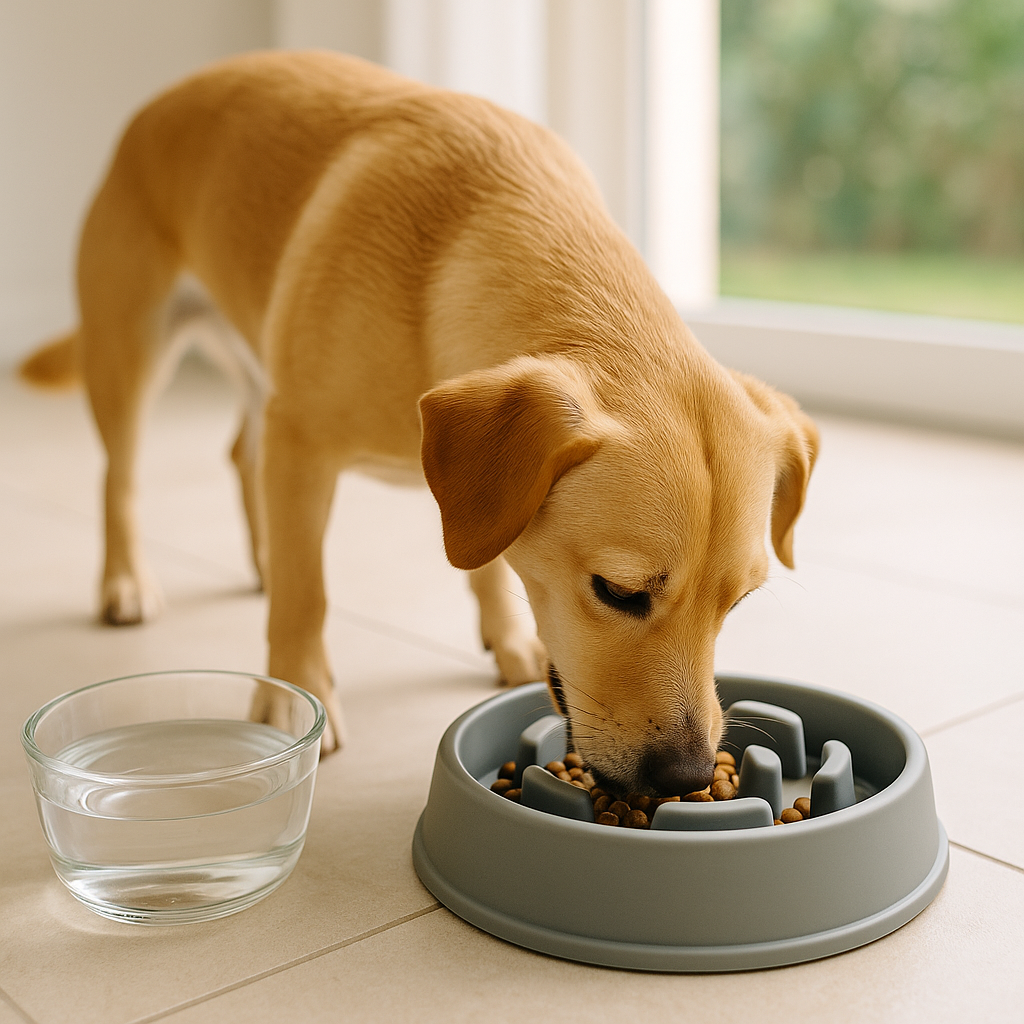
Diet, Hydration, and Exercise
Healthy daily habits are your best defense against digestive problems in dogs.
Tips for prevention:
- Feed a consistent, high-quality diet formulated for your dog’s life stage and health status
- Avoid table scraps, especially fatty or spicy foods
- Transition to new foods gradually over 7 to 10 days
- Ensure clean, fresh water is always available
- Keep treats under 10 percent of daily calorie intake
- Encourage daily walks or gentle play to support bowel movement and maintain a healthy weight
Parasite Prevention and Stress Reduction
Parasites and stress are often-overlooked triggers of digestive problems in dogs. Staying on top of preventatives and reducing anxiety helps keep the gut happy.
Preventive measures:
- Use monthly flea, tick, and heartworm prevention as prescribed
- Deworm regularly, especially in multi-pet or rural households
- Schedule fecal testing 1 to 2 times a year
- Maintain a predictable daily routine
- Create a quiet, safe space during fireworks, travel, or visitors
- Consider vet-recommended calming tools like pheromone diffusers if your dog is anxious
Frequently Asked Questions
What are the first signs of digestive problems in dogs?
The earliest signs often include vomiting, diarrhea, loss of appetite, or gurgling stomach sounds. You may also notice lethargy or changes in stool consistency. If symptoms last more than a day, contact your vet.
Can I give my dog over-the-counter medications?
Never give human medications like Pepto-Bismol, Imodium, or aspirin unless directed by your veterinarian. These can worsen digestive problems in dogs or cause toxic reactions.
Is diarrhea always caused by something they ate?
Not always. While diet is a common cause, diarrhea can also result from parasites, stress, infections, or chronic conditions like inflammatory bowel disease.
How can I safely switch my dog’s food?
Transition gradually by mixing increasing amounts of the new food with the old over 7 to 10 days. Sudden changes are a leading cause of digestive problems in dogs.
What home remedy helps with mild constipation?
Offer a tablespoon of plain canned pumpkin with meals, ensure adequate hydration, and promote light activity. If constipation persists beyond 48 hours, consult your vet.
Is it safe to fast my dog if they have vomiting or diarrhea?
In adult dogs, short fasting (12 to 24 hours) may help rest the digestive tract. Always offer water, and never fast puppies, seniors, or dogs with chronic conditions without veterinary guidance.
Breed-Specific Digestive Risks
Some breeds are more likely to experience digestive problems in dogs due to genetics, anatomy, or metabolism. Knowing your dog’s risk factors can guide preventive care.
High-risk breeds and concerns:
- Great Danes, German Shepherds, Standard Poodles
Prone to bloat (GDV). Use slow-feed bowls and avoid exercise after meals. Consider preventive gastropexy surgery. - Miniature Schnauzers
Often affected by pancreatitis due to fat metabolism issues. Feed a low-fat diet and monitor body condition closely. - Labrador Retrievers, Golden Retrievers, German Shepherds
Commonly experience food allergies or intolerances. Watch for chronic diarrhea, itchy skin, or recurring ear infections. - French Bulldogs, Pugs, Shih Tzus
Brachycephalic breeds may have swallowing difficulties or regurgitation. Serve smaller, more frequent meals and monitor closely.
Talk to your veterinarian about tailored diets or preventive strategies based on your dog’s breed and medical history.
Final Thoughts & When to Seek Help
Digestive problems in dogs are among the most common issues we see in vet clinics, but with timely care, most cases are very treatable. Whether it’s an upset stomach from eating garbage or a more serious issue like pancreatitis, early detection makes all the difference.
Remember these red flags that require immediate veterinary attention:
- Vomiting or diarrhea lasting more than 24 to 48 hours
- Blood in vomit or stool
- Bloated abdomen, restlessness, or non-productive retching
- Sudden collapse or extreme lethargy
By monitoring your dog’s habits, feeding a consistent high-quality diet, and working with your veterinarian, you can prevent many digestive problems in dogs before they start. When in doubt, always consult your vet—it’s better to catch something early than to wait until it’s an emergency.

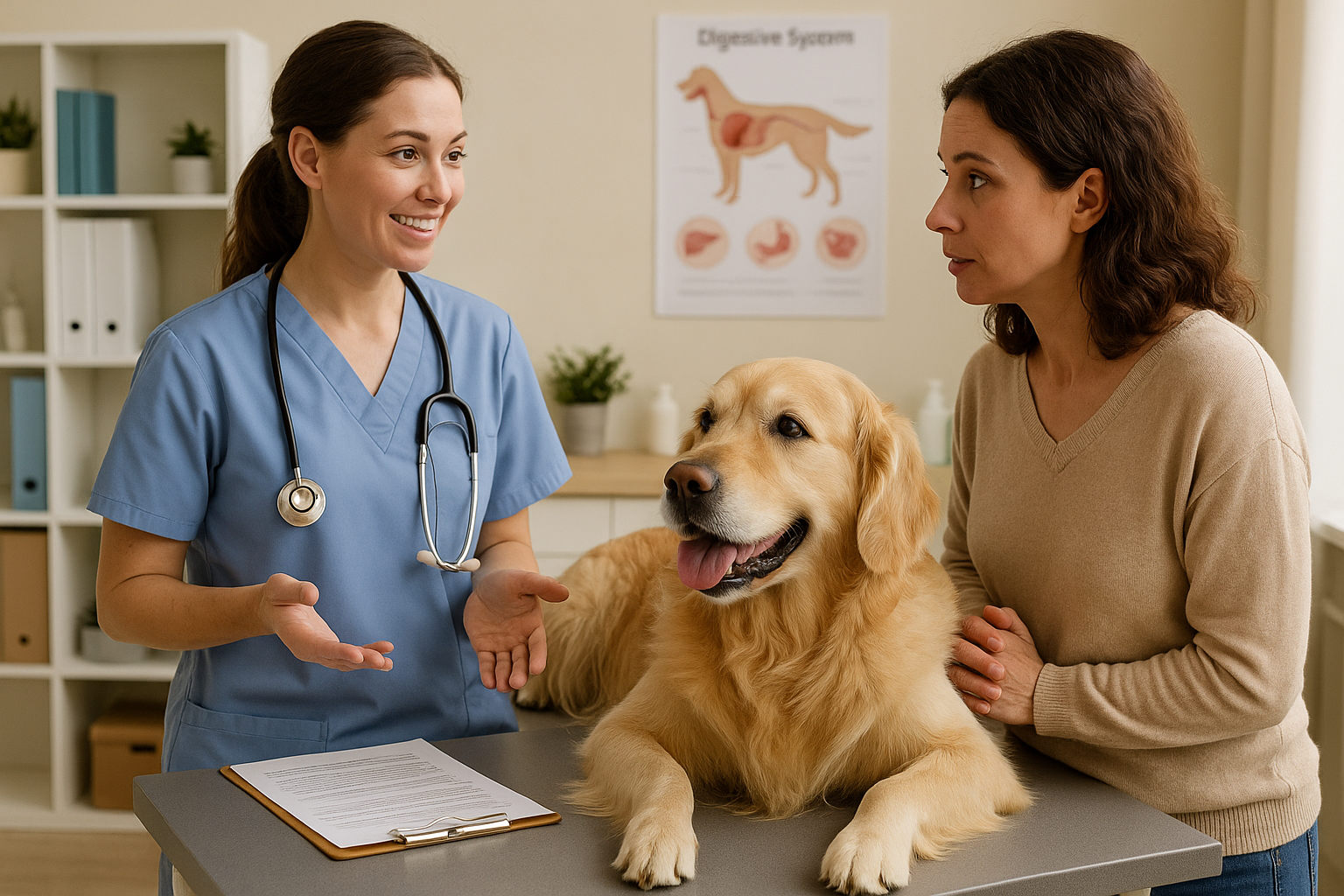
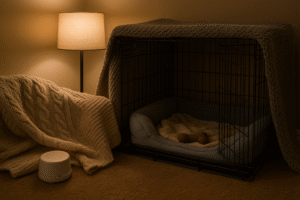
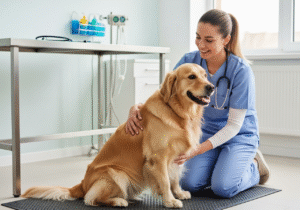

Pingback: Dental Disease in Dogs: 7 Powerful Ways to Prevent Pain and Vet Bills